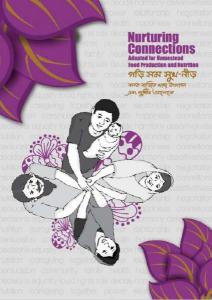Nurturing Connections
The Nurturing Connections curriculum for gender and nutrition, initially developed by Helen Keller International (HKI) in Bangladesh, was inspired by the peer-based “Stepping Stones” program addressing HIV/AIDS and sexual health in Africa.
Both approaches recognize that behavior change is a process that requires internalizing new concepts, that gender norms are driven by community norms and group dynamics, and that adults learn best through action and experience. The curriculum can be adapted to other contexts in Asia. A French language edition, Cultivons les Relations, was developed and tested in West Africa by HKI and the International Center for Research on Women (ICRW).
Nurturing Connections draws on HKI’s decades of experience implementing Enhanced Homestead Food Production (EHFP), an intervention that has been used to empower women in their capacity to produce and contribute to household income while improving the quality and diversity of nutrition for their children and themselves. Nurturing Connections supports not just young women, but also their husbands, fathers-in-law and mothers-in-law, as all family members as well as the surrounding community must work together to confront and overturn gender-based discrimination. The process involves a series of facilitated discussions of two to three hours in length are conducted in each community among peer groups: a group of women (beneficiaries), a group of their husbands, and a group of influential elders.
The curriculum consists of four “Blocks”, or topics, each of which is delivered in weekly discussions over a four week period: 1. Let’s Communicate; 2. Understanding Perceptions and Gender; 3. Negotiating Power; and 4. Acting for Change.
The curriculum is also available in French.
Source: Helen Keller International
Date of Publication: January 21, 2021
SIMILIAR RESOURCES
Tools
Examples
- Promoting the Health of Men who Have Sex with Men Worldwide: A Training Curriculum for Providers
- Providing Reproductive Health Services to Young Married Women and First-time Parents in West Africa
- Gender Transformation for Health A Participatory Toolkit
- Positive Connections: Leading Information and Support Groups for Adolescents Living with HIV
- Improving Interpersonal Communication Between Health Care Providers and Clients
- Hormonal Contraception and HIV - Webinar
- Fake Medicines: Training for Action E-Learning Course
- Healthy Timing and Spacing Of Pregnancy: A Trainer’s Reference Guide
- Integrating SBCC into Service Delivery Programs
- Guidance on Developing a National Deployment and Vaccination Plan for COVID-19 Vaccines

